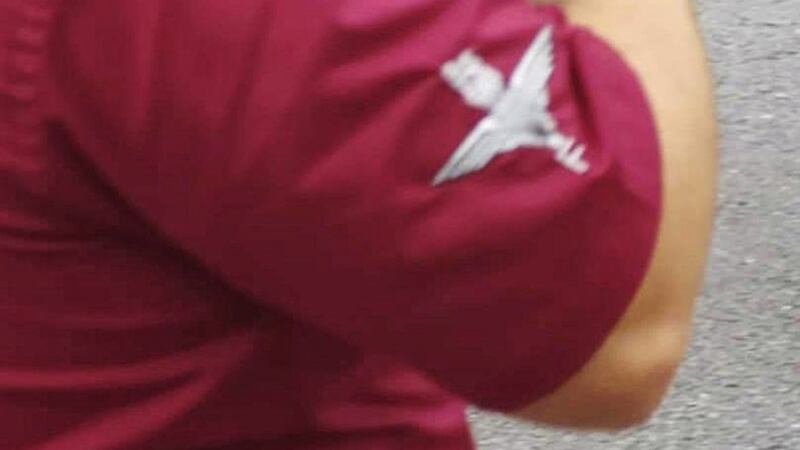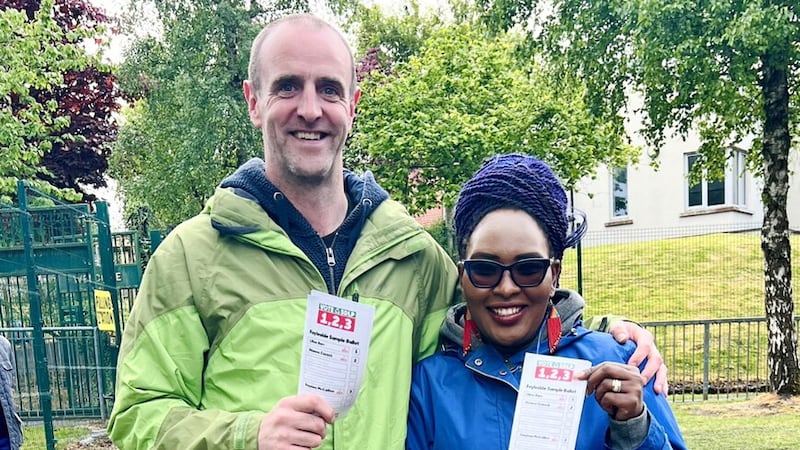Police have defended their handling of a loyalist flute band that paraded close to the scene of Bloody Sunday with a Parachute Regiment symbol on their uniforms.
The actions of officers in their dealings with the Clyde Valley Flute Band in Londonderry on Saturday were "proportionate, responsible and constructive", Police Service of Northern Ireland Assistant Chief Constable Alan Todd said.
Loyalists across Northern Ireland have been using the Parachute Regiment symbol to show support for Soldier F - the veteran Para facing prosecution for two murders and four attempted murders on Bloody Sunday in Derry in January 1972.
Members of the flute band from Larne, Co Antrim, had the insignia and the letter "F" displayed on the sleeves of their uniforms as they took part in the loyal order Apprentice Boys parade in Derry on Saturday.
In an effort to prevent a breach of the peace, a large number of police escorted the band as it made its way through the city. Later, a bus carrying the band home to Larne was stopped by officers on the outskirts of the city.
Officers in armoured vehicles attended and a two-and-a-half-hour stand-off ensued until police finally secured the names and details of some bandsmen. Police have now sent a file to prosecutors to assess whether band members were guilty of provocative conduct.
Mr Todd, who was the overall commander in charge on Saturday, rejected those who have characterised the police operation as "heavy handed".
"I see no grounds for using that description," he said at a press conference in Belfast. "Our engagement before, during and after the parade were by way of discussion and negotiation and it confounds me how anyone can describe that as heavy handed. It was proportionate, responsible and constructive - to style it otherwise, I don't share that assessment."
Mr Todd said people in Northern Ireland are aware of the sensitivities of displaying certain symbols in Derry city.
"Anybody in Northern Ireland, including those of us who have responsibility for policing it, understand there are places where space, history and symbols are contentious," he said.
"That was the situation clearly that we found ourselves in on Saturday in Derry/Londonderry. People understand the contentious nature of symbols and history in that area."
The commander said the vast majority of those who took part in the parade did so within the law, respectfully and with due regard to the sensitivities.
"One band in our view chose not to have a sensitivity towards that context, to the point where we believed that it would have interfered with our legitimate purpose of keeping the peace and keeping people safe," he said.
Mr Todd added: "Given the context of the place, the symbols and the history I don't think anybody who has looked at that carefully is going to argue that that had the potential to raise tension and where you get raised tensions you have the potential for disorder.
"We considered that to be an act of provocation under the Public Order Northern Ireland Order in line with provocative conduct intended or likely to lead to a breach of the peace."
Police are also investigating an illegal protest staged by dissident republican group Saoradh during the Apprentice Boys event.
After Saturday's parade, police and a hall where loyal order members were socialising came under attack by petrol bombers.
Two petrol bombs were thrown at the Apprentice Boys Memorial Hall in the city centre from the direction of the republican Bogside area as people who had taken part in a parade earlier in the day socialised inside.
No-one was injured but police who attended the scene were then also subjected to attack, with a further 15 to 20 petrol bombs and other missiles thrown at them from nearby Fahan Street
Sinn Fein has criticised DUP members, including East Londonderry MP Gregory Campbell, who posed for a photograph beneath a banner incorporating the Parachute Regiment insignia in Derry's unionist Fountain estate on Saturday.
Mr Todd was asked about the image on Monday and whether he considered it to have been provocative behaviour. The commander said he was not aware of the picture and had not seen it.
He added: "People are entitled and a political party are entitled to take a political position and if others wish to comment and make comment on that, that's fine. But all of those things have to be taken on their own merits."
Mr Todd said the issue of symbols depended on where they were displayed, insisting Derry was a "complex" city which could not be considered one place, with one community.
When pressed further on the DUP photo and challenged whether officers were in danger of being seen to be policing political opinions, he added: "I didn't say that they were entitled to stand under a banner or not, I said it was a matter for them to consider and a matter for others to consider.
"I am not, and the police service are not, in the space of policing political parties and policing political positions, what I am in the business of doing is keeping people safe and preventing breaches of the peace. That's what we did on Saturday and that's what we will continue to do to the best of our ability."
Mr Todd was asked whether the police actions in Derry on Saturday contrasted with an operation at a republican bonfire in the New Lodge area of Belfast on Thursday, when armed officers withdrew from the scene when disorder flared.
"I don't draw any comparisons between the two operations whatsoever," he said.
"I understand people's perceptions. We find ourselves in Northern Ireland, not unusually, the reality for those of us who are dealing with all of the facts and all the context and having all the responsibility and having to take all the risks versus those people who choose to make comment without any of those responsibilities and sometimes without some of that knowledge."
Mr Todd said each situation the police deal with was approached with the aim of finding a local solution, with resultant "different answers in different places". He said that should not be used to accuse the police of not acting impartially.
"Impartiality is the one thing we have done really well and that was on Saturday as well," he said.
"We looked at a situation, we didn't overreact to it, we dealt with it in a sensitive and minimalist way to ensure we fulfil our obligations to keep people safe and that's what we did."
He was asked whether the police were in danger of creating a public perception that they withdraw from situations when faced with troublemakers.
"I understand the perception, I don't agree with it," he said. "I am not about to make poor professional policing decisions merely in order to save face on behalf of the police service. Public safety is our number one priority."








